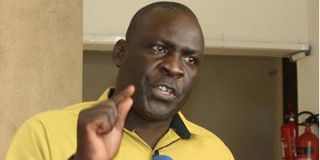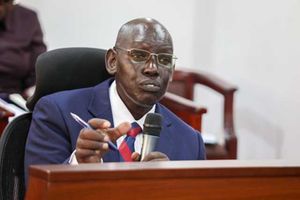
Kenya National Union of Teachers (Knut) Secretary-General Collins Oyuu (left), Samburu branch secretary Richard Lentayaa, and first national vice chairman Malel Langat at Losuk in Samburu West constituency during the burial of Nancy Nampiyan Lentayaa (Mr Lentayaa's mother) on 1 March 2025. Mr Oyuu called on the government to release capitation funds to schools facing financial crisis
Public schools are grappling with severe cash flow challenges following the delayed release of Sh64 billion in capitation funds, even as schools reopen after the mid-term break.
Under the Free Primary Education program, the government allocates Sh1,420 per learner while Junior Schools receive Sh15,042 per student.
Secondary schools are supposed to get Sh22,244 per student under the Free Secondary Education program. However, teachers claim that schools only receive about Sh15,000 per year from the Ministry of Education.
Ideally, 50percnt of capitation should be released in Term One, followed by 30percent in Term Two and 20percent in Term Three. However, the government has consistently failed to adhere to this schedule leaving schools in financial distress.
The Nation has learnt that many schools have been forced to adopt drastic cost-cutting measures, with some introducing food and water rationing while others struggle to cover electricity and wood fuel costs. Teacher shortages have also worsened the situation, forcing school boards to hire additional staff using limited resources.
Kenya National Union of Teachers (Knut) Secretary-General Collins Oyuu and Knut official Malel Langat have urged the government to release the funds immediately, warning that the crisis could disrupt learning.
“How do you manage your schools as a principal without funds due and budgeted for by the government? Some of the institutions’ managers have had to release the learners early enough from schools for half-term breaks and holidays and send away some of them to collect fees. It is a very serious issue,” Mr Oyuu said.
Mr Oyuu said that capitation delays undermine the very purpose of the fund, which is to ensure smooth school operations.
He spoke at burial of Nancy Nampiyan Lentayaa, the mother of Samburu Knut Secretary Richard Lentayaa at the weekend.
“The Ministry of Education and that of National Treasury should release capitation on time to allow the smooth running of institutions across the country so that it does not defeat the purpose the fund was created to solve,” the official said.
Kenya Union of Post Primary Education Teachers (Kuppet) Chairperson Omboko Milemba also asked the government to act swiftly.
“The issue of capitation needs an immediate solution to ensure schools are running without disruption. For quality education to be delivered to our learners, we should ensure that funds are available in good time,” Mr Milemba said.

Kenya Union of Post-Primary Education Teachers National Chairman Omboko Milemba at a past event.
National Treasury Cabinet Secretary John Mbadi has stated that the government will not pay the outstanding capitation arguing that there is no provision for it in the current budget.
“It (capitation) was budgeted for, but our budget is cash-based. If a financial year has ended and you did not pay it, there is no money (to pay later). We do not keep money somewhere. Who would we pay that money to if the capitation was not released then?” Mr Mbadi said in an interview at a local radio station last week.
He questioned whether schools would refund parents if capitation were released after parents had covered the shortfall.
CS Mbadi, however, claimed that funds for the first term had already been disbursed, a statement refuted by school heads who insist that no money has been credited to their accounts.
According to the Treasury, out of the Sh48.8 billion allocated to schools, Sh4.5 billion has been disbursed for Free Primary Education and Sh15.1 billion has been fully paid to Junior Schools.
However, of the Sh28 billion meant for secondary schools, only Sh14 billion has been released, with the remaining Sh14 billion pending availability.
School principals and trade unions have rejected the Treasury’s position, arguing that capitation should be treated as a pending bill.
“The government has not released the money it claims to have done, It the National Treasury has claimed to have paid to the Ministry of Education, then it has not in turn paid the schools in what has created a crisis in the learning institutions,” A principal of a school in Samburu County said.
Another Principal from Nyamira County said: “How are the managers of learning institutions expected to run the schools smoothly if they have no money to pay their suppliers with piling debts dating to five years?”
Raise school fees
To cushion schools from financial strain, the Kenya Secondary School Heads Association (Kessha) has proposed a hike in school fees.
The lobby recommends that parents in national schools pay an additional Sh19,628, those in extra-county schools pay Sh27,488 more while day schools introduce a Sh5,372 annual fee.
Kessha National Chairman Willy Kuria defended the proposal saying the last review of school fees was done seven years ago, and the current economic situation demands an adjustment.
“The money we get hardly caters for expenses and running of schools with the review in fees payment having been done seven years ago thus the need for review in line with the harsh economic realities in the country,” said Mr Kuria.
Mr Kuria noted the funds they receive are insufficient to cover operational costs, adding that last year alone, there was a Sh7,000 deficit per student.
“When the government says it has no money to pay for the unremitted capitation, does it not mean that they are inviting a hike in school fees and learners to be chased home to collect money from their parents?” Mr Kuria wondered.
The official warned that if the government fails to release the pending capitation, schools will have no option but to increase fees or send learners home.
He said schools are already in debt, with some owing suppliers between Sh20 million and Sh70 million, depending on student populations.
Further complicating the situation, Controller of Budget Margaret Nyakang’o has stopped governors from issuing bursaries to students in primary, secondary and tertiary institutions.
This decision has sparked protests from governors, parents, school managers and education stakeholders who argue that bursaries are essential in cushioning struggling learners.
Education Cabinet Secretary Julius Ogamba has urged school managers to remain patient, assuring them that the government is working to resolve the cash flow crisis.










